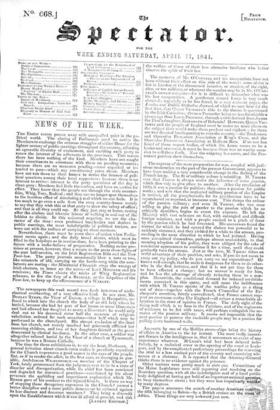The expense of the mere preparation for war, coupled with
judi- cious moderation on the part of the present Government, appears to have been making a very considerable change in the feeling of the French lately. The fit of military ardour is subsiding. M. Tutees says that France is always under the influence of some passion, which dies only to give place to another. After the revolution of 1830, it was a passion for politics; then came a passion for public- works ; and now that the neglected military passion of the Empire is revived, all the paraphernalia for its gratification have to be. repurchased or repaired, at immense cost. This damps the ardour of the passion military; and even M. TUIERS, who was once willing to play the part of' pander to the passion which he so critically describes, begins to count the expense. He left the Ministry with vast schemes on foot, with entangled and difficult foreign relations, and with a people excited to a pitch of furor. by the passion which he had fomented. His successors found the torrent for which he had opened the sluices too powerful to be suddenly stemmed, and they yielded for a while to the stream, pro- ceeding in the same direction to which he had pointed. Having • once committed themselves, perhaps almost unavoidably, to that seeming adoption of his policy, they were obliged for the sake of consistent appearances to continue it for a time, until they could gradually turn the stream. Just at the turn, M. TRIERS takes an artful advantage of their position, and asks, If you do not mean to carry out my policy, why do you carry on my expenditure? He knows well enough, that he made it dangerous for them to do other- wise in the first instance, and that it is not yet time for them to have effected a change ; but no answer is ready for him, and he has the advantage of cleverly reducing them to a non- plus. Meanwhile, the conditional demand for reduced establish- ments conveyed in this query, and still more the indifference with which M. THIERS speaks of the warlike policy as a thing out of date—together with the French Chancellor of the Ex- chequer's assertion, faintly contradicted, that France cannot sup- port an enormous outlay like England—all evince a remarkable al- teration in the state of opinion in France. The daily sight of the rising wall which is to hem in the Parisians, and of the regiments of workmen to be fed with taxes, will perhaps extinguish the re- mains of the passion military. It seems not impossible that the next passion to possess the excitable people may be a passion for pulling down bastioned walls.


























